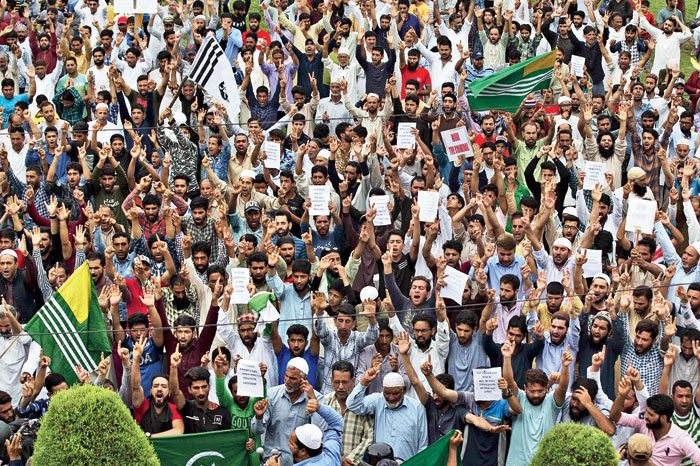The administration of governor Satya Pal Malik on Friday announced that fortnight-long restrictions in the Kashmir Valley would be eased in a phased manner, promising to reinstate some telecom connectivity and open schools as first steps towards the full restoration of normality.
The Valley has been facing curfew-like restrictions and a complete information blockade since the evening of August 4. Schools, educational institutions, government offices and businesses are shut, vehicles have stayed off the roads and mobile, Internet and landline connectivity are suspended.
The restrictions remained in place on Friday and no prayers were allowed at several mosques and shrines, including Srinagar’s Jamia Masjid and Hazratbal.
Jammu and Kashmir chief secretary B.V.R. Subrahmanyam said the restrictions would be eased in the next few days in an orderly manner after Friday prayers.
“Schools will be opened after the weekend, area-wise, so that children’s studies do not suffer,” the chief secretary told reporters in Srinagar. He did not elaborate which schools would be opened first. It is, however, unlikely that high schools and colleges will open in the first phase because of fear of protests by students.
Subrahmanyam said telecom connectivity would be restored in a phased manner from Friday night and “keeping in mind the constant threat posed by terrorist organisations in using mobile connectivity to organise terror actions”.
The chief secretary also said preventive detentions were being continuously reviewed and appropriate decisions would be taken based on law-and-order assessments. Hundreds of leaders from the pro-India camp, including chief ministers Omar Abdullah and Mehbooba Mufti, and separatists are behind bars.
“It is expected that over the next few days, as the restrictions are eased, life in Jammu and Kashmir will become completely normal,” Subrahmanyam said.
He presented a rosy picture of the situation, claiming that government offices had been made fully operational and 12 of 22 districts — in Jammu and Ladakh — were functioning normally with some limited night-time restrictions in five districts.
Official sources, however, said most government offices had been paralysed by the restrictions, with only a few employees joining work.
He claimed that relaxations had been offered on Id to allow people to offer prayers, but on the ground tougher restrictions were in place and prayers at most big idgahs and mosques were barred.
Subrahmanyam defended the decision to abrogate Jammu and Kashmir’s special status and claimed that the steps taken on August 5 were aimed at promoting long-term welfare of people, better governance and accelerated development.
“The government’s approach was guided by the conviction that all-round development was the most credible solution to address separatist sentiments that were propagated by vested interests,” he said.
“Such sentiments were being utilised to legitimise a policy of cross-border terrorism that has cost the lives of thousands of inhabitants of the state and the country,” the chief secretary added.
Subrahmanyam said the restrictions were imposed in view of credible inputs that militant organisations were planning attacks in the immediate future.











